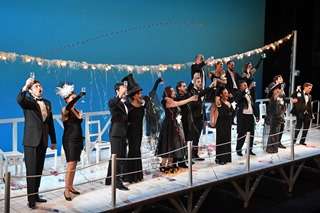|
Back
Out of Season Royalist Celebration Barcelona
Gran Teatre del Liceu
09/13/2017 - & September 14, 15, 17, 18*, 19, 20, 2017
Gioachino Rossini: Il viaggio a Reims, ossia l’albergo del giglio d’oro
Adriana González/Irina Lungu* (Corinna), Maite Beaumont/Marina Viotti* (Marquise Melibea), Leonor Bonilla*/Sabina Puértolas (Countess Folleville), Ruth Iniesta/Marigona Qerkezi* (Madame Cortese), Juan de Dios Mateos/Taylor Stayton* (Chevalier Belfiore), Lawrence Brownlee/Levy Sekgapane* (Count de Libenskof), Baurzhan Anderzhanov/Roberto Tagliavini* (Lord Sydney), Pedro Quiralte*/Pietro Spagnoli (Don Profondo), Carlos Chausson*/Vincenzo Nizzardo (Baron Trombonok), Gurgen Baveyan/Manel Esteve* (Don Alvaro), Alessio Cacciamani (Don Prudenzio), Jorge Franco (Don Luigino), Paula Sánchez-Valverde (Delia), Marzia Marzo (Maddalena), Tamara Gura (Modestina), Benat Egiarte (Zefirino, Gelsomino), Carles Pachón (Antonio)
Orquestra Simfònica del Gran Teatre del Liceu, Giacomo Sagripanti (conductor)
Emilio Sagi (Stage Director), Pepa Ojanguren (costumes), Eduardo Bravo (Lighting)

(© A. Bofill)
Rossini’s last Italian opera, Il viaggio a Reims, ossia l’albergo del giglio d’oro, was a pièce d’occasion, performed for the coronation of Charles X, King of France, in 1825 in the brief period the French monarchy was restored. Rossini himself never expected it to be played beyond its four first performances. He cannibalized much of the music into his sublime bittersweet comic opera Le Comte Ory. The idea of restoring an ode to the monarchy in an epoch France has long been staunchly republican may seem risible to many. The previously thought lost manuscript was found and restored by Rossini musicologist Philip Gossett. The venerable Pesaro Rossini Opera Festival witnessed its rebirth in 1984 with a stellar cast as was the case at Rossini’s time. Under such circumstances, the meagre plot with an absurdly high number of protagonists, eighteen, makes some sense. In theatre, one cannot clearly follow the action if the number of protagonists exceeds eight, but allowances can be made when it is easily identifiable superstars rather than characters in an opera that one follows on stage. This is precisely the problem with productions of Il viaggio a Reims in recent years: limited star power. Only in Act II with its series of songs from the native lands of the various noble guests at Albergo del giglio d’oro: the French Countess Folleville, German Baron Trombonok, the Polish Marquise Melbea, the Russian Count Libenskof, the English Lord Sydney, the Italian antique dealer Don Profondo, the Spanish nobleman Don Alvaro, etc. did one figure out the intricate characters and their relationships.
What most characterized the cast is disparity. Some were worthy of the Pesaro stellar revival such as South African tenor Levy Sekgapane and soprano Irina Lungu as the poetess Corinna, and some that one wishes had silent roles. Sekgapane managed the difficult coloratura and had amazing ease in his high notes. Taylor Stayton as Chevalier Belfiore also acquitted himself well. It is to be noted that Roberto Tagliavini replaced his ailing colleague from the alternate cast, thus singing the role of Lord Sydney on four consecutive nights. With his virile basso and commanding stage presence, Tagliavini gave a moving rendition of his aria “Ah! Perché la conobbi?” Pedro Quiralte’s amusing aria “Medaglie incomparabili”, a charming account of the cosmopolitan guests of the Albergo, was well sung but lacked the needed panache. In contrast, soprano Marigona Qerkezi as the innkeeper Madame Cortese had brittle high notes and painful transitions when changing registers. There was virtually no applause following her opening aria. Mezzo Marina Viotti as the Polish Marchess Melibea had a warm seductive timbre. Even without a stellar cast, the cost of hiring so many soloists must be extravagant. Perhaps that is the reason why the sets were minimal. It is a real pity as the sets of a posh hotel would have been pleasant. The 1920s costumes and the droll choreography in the Act II dances somewhat compensated for that. The ensembles, “A tal colpo inaspettato” for fourteen voices and the sextet “Donna ingrate”, were very well rehearsed, the more proficient singers covering for the weaker ones, resulting in a brilliant end product despite the weaknesses. The silly plot seemed appropriate in the late 80s to the early 90s, the heyday of the revival of the work. The fall of communism was analogous to the fall of the revolutionary French republic, and there was so much hope for a “free” and integrated Europe amiably celebrating the difference of Poland, Germany, Russia, England, Spain, Italy and France. However, in the age of Brexit and other movements contesting pan-Europeanism, the joyous naïveté comes less naturally. Nonetheless, despite its flaws, it was an entertaining performance with some great Rossini singing.
Ossama el Naggar
|